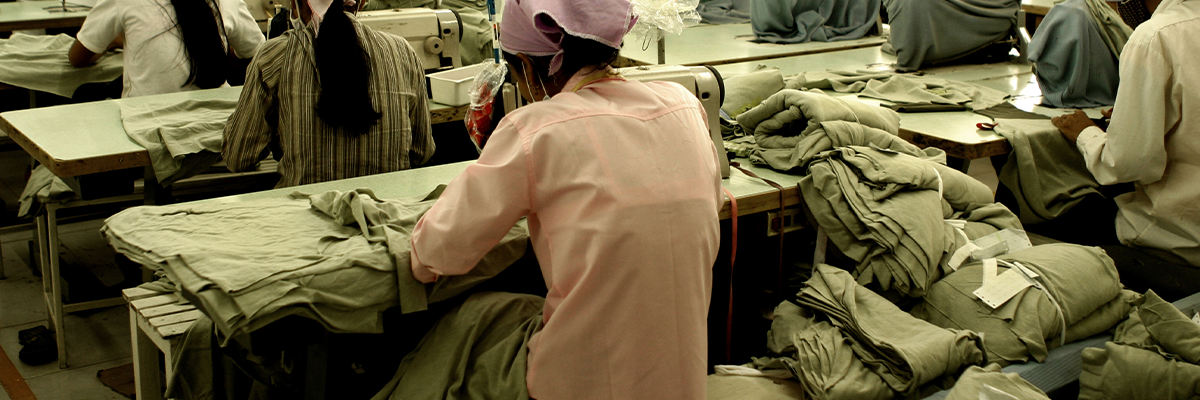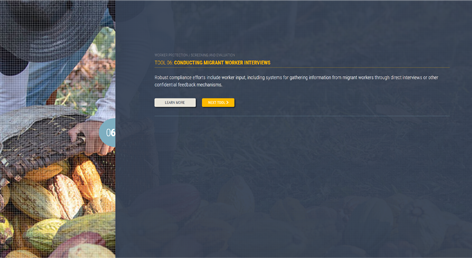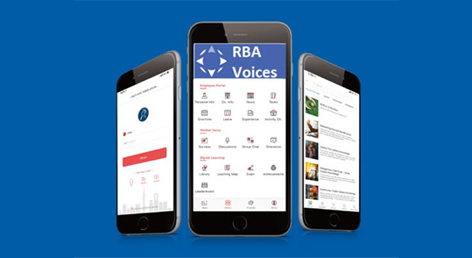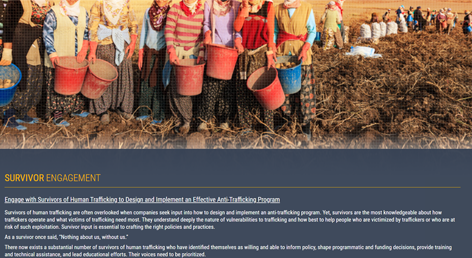
Human Trafficking in the Health Care Supply Chain
Mitigating Human Trafficking Risks
IN THE HEALTH CARE SUPPLY CHAIN
These resources on human trafficking in health care give key stakeholders the necessary tools to comprehend and tackle the risks associated with forced labor in supply chains, encompassing direct and indirect procurement.
Developed in partnership with subject matter experts from both the public and private sectors, these samples, templates, risk assessment tools, supply chain mapping techniques, due diligence guidelines, and worker engagement strategies will empower your organization to enact impactful and positive change by integrating robust anti-forced labor policies into your management systems, mapping high-risk supply chains, ensuring compliance within supply chains, and more.
"Considerations for the Health Sector on Forced Labor Risk in Supply Chains”
The International Labor Organization estimates 27.6 million people are in forced labor globally across various industries. These considerations can help mitigate the risk of and remediate forced labor and related exploitation throughout healthcare and public health supply chains.
Read Now Learn More
Samples & Templates for Management Systems
-
- ABA Model Business and Supplier Policies on Labor Trafficking and Child Labor - American Bar Association
- Termination of certain grants, contracts and cooperative agreements - ASPR
- Health Standards of Conduct: Our Values in Action (Policy and Reference Guide) - CommonSpirit
- Human Trafficking Policy - Premier
- Forced Labor Risk in Supply Chains: Considerations for the Healthcare & Public Health Sector, 508 - Joint Forced Labor Working Group
- Forced Labor Risk in Supply Chains: Considerations for the Healthcare & Public Health Sector, Step 1 - Joint Forced Labor Working Group
- Forced Labor Risk in Supply Chains: Considerations for the Healthcare & Public Health Sector, Step 2-3 - Joint Forced Labor Working Group
-
- HCA Code of Conduct - HCA
- HealthTrust Code of Conduct - HealthTrust
- HealthTrust Supplier Business Relationship - HealthTrust
- Premier Code of Conduct - Premier
- Premier Supplier Standards - Premier
- U.S. Department of State Sample Code of Conduct - U.S. Department of State
- U.S. Department of State Sample Supplier Agreement - U.S. Department of State
- Sample Code of Conduct Provisions for Companies - Verite
- Sample Code of Conduct Provisions for Suppliers - Verite
- Health Care Code for Ethical International Recruitment and Employment Practices - Alliance for Ethical International Recruitment and Employment Practices
- WHO Global Code of Practice on the International Recruitment of Health Personnel - World Health Organization
-
Risk Assessment
-
U.S. Department of Labor
The Better Trade Tool empowers users to advance efforts in supply chain transparency as well as strategic sourcing priorities. This innovative tool integrates existing reporting developed by the Bureau of International Labor Affairs (ILAB) with U.S. import trade data, including Harmonized Tariff Schedule codes.
-
Verite
The link between commodities and some of the worst forms of labor abuse in the global economy is coming under increasing scrutiny from stakeholders around the world. Several global campaigns seek to raise public awareness about goods produced under forced labor conditions and modern forms of slavery. The Verité Forced Labor Commodity Atlas contributes to those efforts.
-
U.S. Department of Labor
Check countries' efforts to eliminate child labor; find child labor data; browse goods produced with child or forced labor; review laws, ratifications, and enforcement efforts; see what governments can do to end child labor; explore visualizations of USDOL's child labor and forced labor data.
-
Verite
On this page, users will find information on different frameworks and resources for evaluating trafficking risk at different levels of specificity and precision, including outlines of the risk factor frameworks used in compiling the risk factor analyses for the commodity and country reports.
-
U.S. Department of the Treasury
Check entities against a database of sanctions administered by the Office of Foreign Assets Control, including Global Magnitsky (GLOMAG) and EO 13581 on Blocking Property of Transnational Criminal Organizations (TCO), which can be issued for human trafficking.
-
Traffik Analysis Hub
The Traffik Analysis Hub (TAHub) is a partnership that includes financial institutions, NGOs, law enforcement and government agencies who are all unified by the common goal of sharing data to stop human trafficking. Using advanced cognitive technologies developed by IBM, the TAHub will facilitate the sharing of information quickly and easily and combine multiple data sets in one secure system.
-
OECD
This Guidance helps business enterprises to understand and implement due diligence for RBC as foreseen in the OECD Guidelines for MNEs. This Guidance also seeks to promote a common understanding amongst governments and stakeholders on due diligence for RBC.
-
Responsible Sourcing Tool
Responsible Sourcing Tool is the result of the collaboration between Verité and the U.S. Department of State’s Office to Monitor and Combat Trafficking in Persons.
Supply Chain Mapping
Verite
CUMULUS
Verité’s CUMULUS Forced Labor Screen™ maps cross border labor supply chains using patented technology to gather data on workforces, recruiters, and unethical recruitment and employment practices. Learn More »
KnowtheChain
KnowTheChain Benchmarks
The KnowTheChain benchmarks evaluate corporate efforts to assess forced labour risks in their supply chains and publishes sector-specific benchmarks every two years. Learn More »
U.S. Department of Labor
List of Goods Produced by Child or Forced Labor
The Bureau of International Labor Affairs (ILAB) maintains a list of goods and their source countries which it has reason to believe are produced by child labor or forced labor in violation of international standards. The List of Goods Produced by Child Labor or Forced Labor comprises 159 goods from 78 countries and areas, as of September 28, 2022. Learn More »
U.S. Department of Labor
List of Products Produced by Forced or Indentured Child Labor
ILAB maintains a list of products and their source countries which it has a reasonable basis to believe are produced by forced or indentured child labor. Learn More »
U.S. Department of State
Responsible Sourcing Tool
The Responsible Sourcing Tool (RST), developed through a collaboration between Verité and the U.S. Department of State, is provided to assist U.S. federal contractors, procurement officials, and other private sector companies better identify, prevent, and address the risks of human trafficking, including forced labor, in their supply chains. Learn More »
Due Diligence
-
The Global Spotlight on Labor Trafficking in Corporate Supply Chains-Know Your Obligations
Jones Day
This Jones Day White Paper describes the recent legislation in this area, sets forth the possible ramifications for failing to know and understand the corporate obligations, and analyzes the possibility of future legislation and litigation.
Labor Trafficking in Corporate Supply Chains-Where We Are Now
Jones Day
In the United States, consumers have sued manufacturers for failing to disclose the presence of forced labor in their supply chains. These claims have been based on consumer protection laws, the Alien Tort Statute, and the Trafficking Victims Protection Reauthorization Act.
Companies to Navigate Complex and Changing Requirements Focused on Combatting Forced Labor in Supply Chains
Jones Day
This Jones Day White Paper urges corporations across industries to consider reviewing, tracking and appropriately adapting to developments in anti-trafficking law and theories of liability. There is also a focus on companies addressing these issues by evaluating compliance and risk mitigation procedures throughout their domestic and international supply chains.
Global Spotlight on Labor Trafficking in Health Care and Corporate Supply Chains
Jones Day
This Jones Day White Paper serves as an update to our prior publications regarding legislation and executive action aimed at curbing forced labor in supply chains, with an additional focus on the effect of the COVID-19 pandemic.
JONES DAY TALKS®: Jones Day’s Anti-Human Trafficking Initiative: Health Care Supply Chains and Forced Labor
Jones Day
A recent special convening hosted in Jones Day's Chicago Office, Forced Labor in Health Care Supply Chains: What Hospital Leaders Need to Know, focused specifically on health care supply chain issues and how they may interact with forced labor. The event provided practical information and resources to health care providers fighting human trafficking.
Free Introductory Course on Forced Labor
Verite
This interactive e-learning course provides a brief overview of international frameworks and identifies some of the risky business practices that can lead to forced labor in supply chains.
Quizrr
Quizrr
Quizrr creates worker-centric, engaging and gamified digital content with short live-action and animated films followed by a quiz – always in local language and setting. Our educational platform, leveraging Social Practice Theory, is built for inclusivity, making sure anyone, no matter digital literacy levels, can benefit from the training.
ULUA
ULUA
Ulula OWL app enables simple, interactive training and capacity development for workers. Strengthen workers’ understanding around health and safety, labor regulation and other skills. Access local resources to support worker wellbeing. Use custom surveys to help test knowledge gained from training modules.
FACT – Matera Alliance
National Rural Health Resource Center, 2014
FACT® (Factory Awareness to Counter Trafficking) training creates a safe and rewarding learning environment for factory employees. It is highly employee-centric and its unique incentivize structure encourages factory employees to participate. As a compliance manager from a top U.S. retail brand stated, “So surprised to see so many workers actually interested in the training. In other trainings, they don’t really pay attention.”
-
Federal Statutory and Regulatory Framework on Forced Labor in Healthcare and Public Health Supply Chains Information Memorandum
U.S. Department of Health and Human Services
This Information Memorandum (IM) is directed toward healthcare administrators, procurement professionals, suppliers, and other decisionmakers in the healthcare and public health (HPH) sector who may be positioned to address forced labor concerns in supply chains through product procurement and labor contracting practices.
Trafficking in Persons Report
U.S. Department of State
The world’s most comprehensive resource of governmental anti-trafficking efforts and reflects the U.S. Government’s commitment to global leadership on this key human rights and law enforcement issue.
UFLPA Entity List
U.S. Department of Homeland Security
A list of entities in Xinjiang that mine, produce, or manufacture wholly or in part any goods, wares, articles and merchandise with forced labor.
Withhold Release Orders and Findings List
U.S. Department of Homeland Security
CBP issues a WRO when the agency has reasonable evidence of the use of forced labor in the manufacturing or production of a good or goods entering the U.S. supply chain. A WRO allows CBP to detail the products in question at all U.S. ports of entry until/unless importers can prove the absence of forced labor in their product's supply chain. This page contains withhold release orders issued by the Commissioner and findings published in the Federal Register.
Worker Engagement

Conducting Migrant Worker Interviews
Responsible Sourcing Tool
Robust compliance efforts include worker input, including systems for gathering information from migrant workers through direct interviews or other confidential feedback mechanisms.

RBA Worker Voice Platform
Responsible Business Alliance
The RBA Worker Voice Platform includes worker surveys, on-site assessment support, mobile learning, and feedback and grievance reporting.


